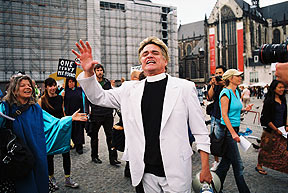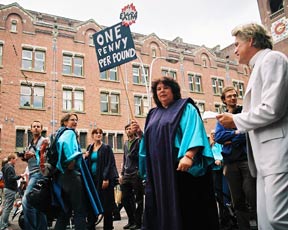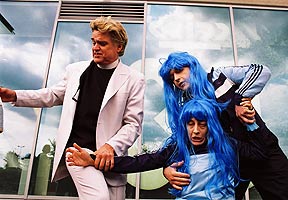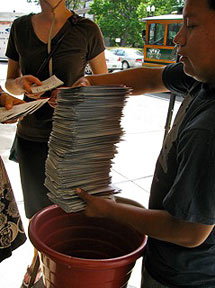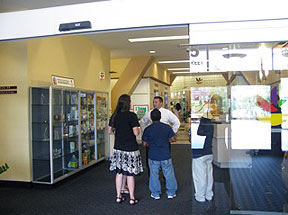|
In the U.S., the tour crew (pictured above) delivered nearly 1,000 postcards — each signed by consumers during the first half of the three-week tour — to Ahold USA’s corporate headquarters in Quincy, MA. |
They were joined by the one and only Rev. Billy of the Church of Life after Shopping, shown here above talking with a member of the Dutch media before the launch of the march. Rev. Billy was in Amsterdam for the premier of “Crazyshopping,” a musical comedy which opened Sunday in Amsterdam’s biggest theater, the 1750 seat Royal Carre Theater. |
|
|
|
|
|
The Ahold representative emphasized his company’s ongoing “investigation” of its Florida tomato supply chain and its two meetings with CIW representatives as evidence that his company is taking the Campaign for Fair Food seriously (though, as the Campaign is now entering its second decade and counts nine other major food corporations among its active partners — and the slavery operation that Ahold claims to be “investgating” was investigated and prosecuted in US federal court — it would seem that the time for “investigation” is over and the time for action is now…). From all reports, the exciting Amsterdam action — and Ahold’s continuing refusal to join in a formal partnership with the CIW for fair farm labor conditions — left the Dutch branch of the Campaign for Fair Food energized and ready for more acton in the weeks and months ahead! |
|
This Stop&Shop distribution truck (Stop&Shop is one of Ahold’s key US grocery chains) conveniently led the way along a good stretch of the route. |
|
|
Ahold’s corporate employees could hardly look out their windows without seeing the museum and the crowd it attracted throughout the day. |
|
|
|
But before our delegation was allowed to leave on such a bitter note, it appears that some cooler minds within Ahold may have regretted their hard-line “leave it on the sidewalk” security position, as the head of security was dispatched to meet the delegation. |
 Although we’re not sure you could call it a meeting, since it consisted of little more than Ahold’s security chief taking the stack of postcards, turning, and walking back inside… |
Adams was a staunch foe of slavery and his son, John Quincy Adams, successfully argued the famous “Amistad” case in the Supreme Court, resulting in the freedom of dozens of Africans who had seized control of the slave ship on which they were being transported to the new world before it could deliver them into a life of slavery. But before Amistad, and more than half a century before the Emancipation Proclamation, Adams the elder had this to say about slavery: “Consenting to slavery is a sacrilegious breach of trust, as offensive in the sight of God as it is derogatory from our own honor or interest of happiness” Two hundred years later, those words remain wise and needed counsel, for Ahold, and the food industry as a whole, from farm to plate.
|



